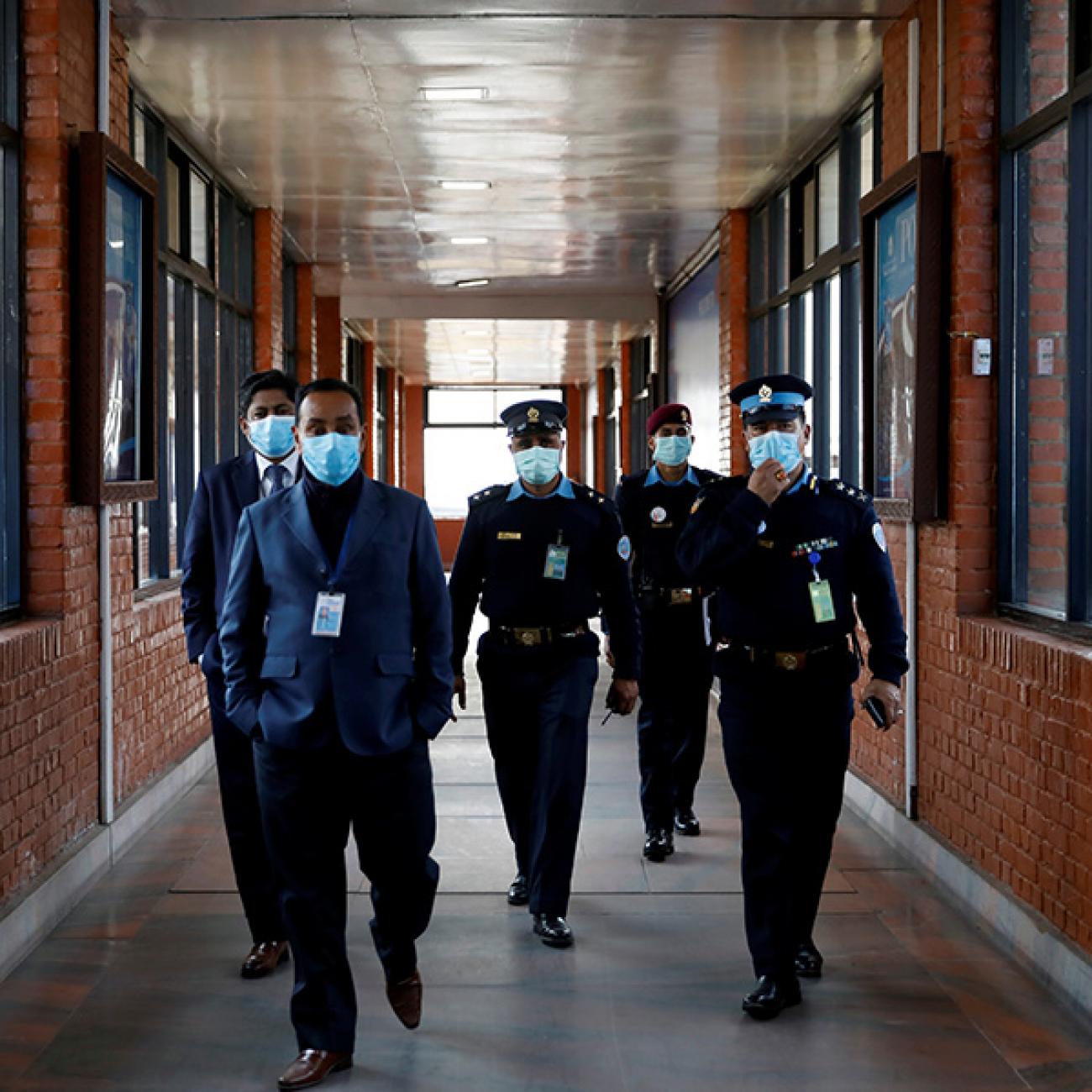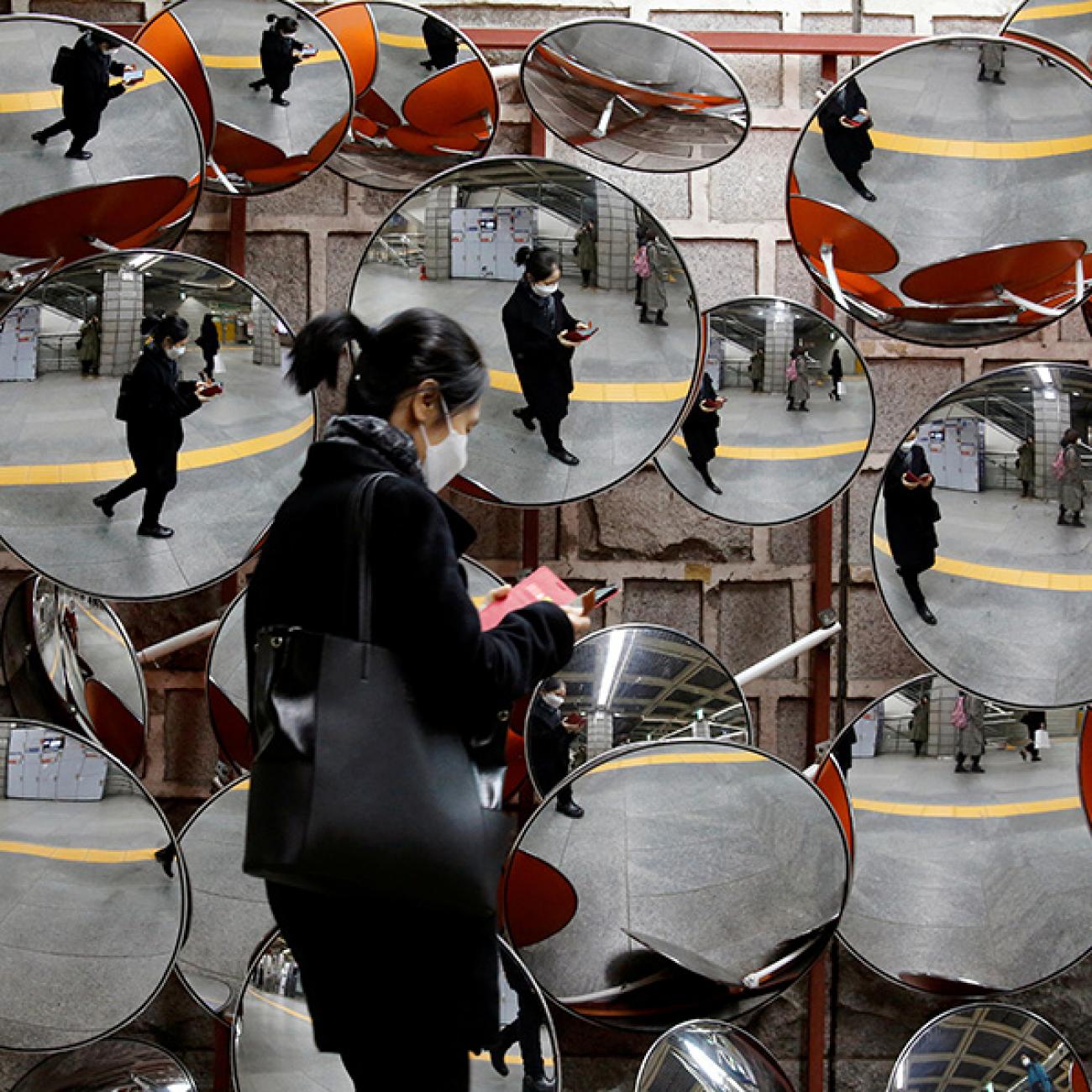Europe is now the epicenter of the COVID-19 pandemic. An increasing number of countries around the world have restricted travel for Europeans—even the Islamic terrorist group ISIS in its latest al-Naba newsletter advised members to “stay away from the land of the epidemic.” Borders are also increasingly going up in unilateral moves between countries in the European Union, Schengen or no Schengen. More than 100 million people across the continent are on lockdown. Even the European Commission has called for a temporary ban on travel to the EU ignoring the recommendations of the World Health Organization to keep borders open.
More than 100 million people across the continent are on lockdown
Citizens want their leaders to take strong action, and closing borders are important visible political acts, whether to keep out viruses or people. Heads of state are beginning to take over from health ministers in addressing the nation, advising people to stay calm, accept the draconian social distancing measures, and remain confident in the economy. Chancellor Kurz of Austria is highly visible and Boris Johnson’s government will give daily televised press conferences to update the public on the fight against coronavirus starting today. Heads of government are now severely criticized if they do not speak to their citizens directly and regularly.

The crisis meetings of the EU health ministers continue, but solidarity seems to be a rare political commodity these days. In response a number of prominent figures are calling for a “European response” to the coronavirus threat. It states in its second paragraph: “We, European citizens, are worried and scared by this threat; and even more by the cacophony, selfishness and self-destructive short-sightedness of the different, uncoordinated national responses…”
At this point a convergence of lockdowns is emerging, as the realization of the seriousness of the pandemic is finally sinking in
Over the past week every country was moving on its own at different speeds in devising a health and containment strategy, despite desperate attempts by the European Commission to coordinate these approaches. At this point a convergence of lockdowns is emerging, as the realization of the seriousness of the pandemic is finally sinking in. In a macabre rerun of events in 1919 during the Spanish flu pandemic, this did not stop mass gatherings altogether. Many have gone forward, like for example the yellow vests demonstrations, a record-breaking smurf festival in France, and soccer games in several member states. Difficulties have also emerged because many EU countries have federal structures that place the responsibility for health at regional, state, and local level, leaving national health ministers with little power, as emergency laws are not tough enough.

As mobility is restricted and borders are now closed due to the pandemic, it seems as if country leaders and citizens are only just realizing the extent to which they are already integrated, interconnected, and interdependent after more than sixty years—and how difficult it will be to disentangle.
Europe is not capable of a rapid collective health response, and it is paying the price
There are those, of course, who hope that many of the border restriction introduced now will remain after the pandemic. The glaring gaps within the European integration process are also becoming clear—as the European member states have jealously guarded their national health responsibilities, they have neglected to build joint mechanisms for health solidarity in times of a pandemic. Europe is not capable of a rapid collective health response, and it is paying the price.
True to its nature, the EU is doing better on the economic front, where it has learned the hard lessons from the financial crisis in 2008. The European Finance Ministers have a Eurogroup phone meeting today to agree on a comprehensive and coordinated economic policy in response to the coronavirus crisis. The G7 has a videoconference today as well to coordinate their research efforts on a vaccine and treatments—as well as economic and financial responses.

Christine Lagarde, president of the European Central Bank, stated that the “spread of the coronavirus COVID-19 has been a major shock to the growth prospects of the global economy and the euro areas economy and it has heightened market volatility.” Ursula von der Leyen, the president of the European Commission, made clear when she said recently, “We will do whatever is necessary to support the Europeans and the European economy.” In a radical move the Commission will also allow countries to run bigger budget deficits than normally allowed. One of the most important political steps was that Germany dropped its stubborn insistence on balanced budgets.
On March 14 Italy reported 21,157 COVID-19 cases and 1,441 deaths. Its health care system is nearing collapse, and it lacks staff, beds and equipment
The Commission has rapidly adopted a €37 billion Coronavirus Response Investment Initiative, designed to support the European healthcare sector, the labor market, and small businesses from all affected sectors. For the health sector, this means support to COVID-19-relevant health expenditures in any part of the member states, including hospital equipment, respirators, and masks. The EU budget will deploy its existing instruments to support small businesses with liquidity, complementing the measures taken at a national level. The European Investment Fund will guarantee €8 billion in loans for 100,000 small- and mid-sized businesses. Countries are offering businesses credit to stay afloat as well as exploring ways to compensate citizens for lost wages.

The proof of the pudding will be in the eating—especially the extent to which the European Commission and other EU countries are willing to help Italy, which has been hit hardest by the virus but has limited resources to respond because of a weak economy and enormous debt load. On March 14 Italy reported 21,157 cases of COVID-19 and 1,441 deaths. Its health care system is nearing collapse, and it lacks staff, beds, and equipment.
The fact that Germany is now partially closing its borders sends out a fatal signal for European unity and crisis resilience
The Corona Investment Response Initiative calculates support for Italy to include providing €853 million of liquidity, to be topped off by €1.46 billion from the EU budget. It will also allow Italy to spend €9 billion of unallocated cohesion money, half of which will come from the EU budget. The Italian government has announced a multibillion-euro economic aid package for health care, businesses and citizens. Italy, the European epicenter, exemplifies how a pattern of global and European economic relationships drives the European pandemic.
Italy shares borders with a number of (now also highly affected) EU member states—for example 68,000 Italians go to work in the Swiss canton of Ticino every day, including people who work in the Swiss health care system. Austria has closed its border with Italy, resulting in a 90-kilometre-long traffic jam at the Brenner crossing. Flights and trains between Austria and Italy are also stopped. The fact that Germany is now partially closing its borders sends out a fatal signal for European unity and crisis resilience.

Closing borders and pursing national policies is a prime policy response and reflect how urgently the EU needs a collective health response under a strong leadership of the Commission which respects its key principles of solidarity and open borders.
China is one of the key trading partners of Italy, and in 2017 Italy imported €28.4 billion worth of goods from China
Many tend to see Italy only as the great tourist destination and do not realize that despite its problems Italy has the fourth largest GDP in the EU and shipped $546.9 billion worth of products around the globe in 2018. China is one of the key trading partners of Italy, and in 2017 alone Italy imported €28.4 billion worth of goods from China. The most coronavirus-affected Northern cities and regions have long standing close economic links with China, which were reinforced when Italy became the first major European economy to join the Chinese Belt and Road initiative. Italy is also the European nation with the highest number of air connections with China.
While a range of political and economic risks were identified in relation to these growing economic ties of China with several countries around the Mediterranean, a virus outbreak was not amongst them. The lesson to be drawn is that trade policies should include health-related considerations, including production sites of pharmaceuticals and other medical goods, supply chains, and innovation hubs.

As they watch the Italian figures rise, EU member states fear a lack of equipment and worry about a potential shortage of medicines. In preparation for a shortage, Lithuania is already looking for alternatives such as the production of medical fabric masks made of cotton.
Since crises can always open windows of opportunities, these actions give an indication of joint mechanisms for health solidarity on a European level
EU Member States now stress not only the need of information sharing but a willingness to consider joint procurement and an equitable distribution of equipment, especially to the regions most affected. Germany and France initially limited the export of equipment but have since been convinced by Ursula von der Leyen to adapt their national measures. Since crises can always open windows of opportunities, these actions give an indication of joint mechanisms for health solidarity on a European level that need to be established during this window of opportunity. The EC is now working on an export authorization scheme for protective equipment in an effort to protect European health workers and contain the escalating coronavirus outbreak. Essential medical goods can only be exported to non-EU countries with the explicit authorization of member states’ governments.
The European Commission is trying hard to counteract the lack of solidarity between countries. One inroad is to strengthen evidence-based policymaking, and Ursula von der Leyen has announced the launch of a scientific board that will convene during the pandemic composed of, in her words, “outstanding scientists—epidemiologists and virologists—to assess the ongoing situation and help us develop the most effective responses.” We would however suggest that the board should incorporate (in addition to the medical experts) experts in health systems strengthening, public health, and social and political sciences to give more comprehensive policy advice.

Beyond the economic impact, the outbreak of COVID-19 clearly shows interlinkages of health with other policies such as the climate sector—a priority policy area for the European Commission, exemplified through its Green Deal [PDF].
Being in full crisis mode, the EU is trying to pull all necessary actions together and coordinate them, which is plausible—but it can’t stop there
While the decline in flights, closure of factories, and cancellation of big events might reduce carbon emissions temporarily, experts also warn of the rebound effects if factories try to make up for lost business. The EU should use its expertise in different policy fields to respond comprehensively to the outbreak, aiming for sustainable solutions. This means going beyond purely market-oriented investment programmes and taking their consequences for human well-being and ecological sustainability into account.
Being in full crisis mode, the EU is trying to pull all necessary actions together and coordinate them, which is plausible—but it can’t stop there. What is missing in the current debate is the notion of recovery: how can we regionally in Europe (but also globally) construct sustainable responses to the crisis? This might include the incorporation of health risks within the economic sector, strengthening of crucial components of health systems such as health workforce worldwide and the funding of universal health coverage initiatives to better protect the most marginalized communities around the globe.

On a European level, a stronger focus must be paid to the global health responsibilities. The EU should support weaker health systems and strengthen the role of the WHO working towards global solidarity as this remains the only means to respond to an international health crisis adequately.
If Europe uses this moment of crisis well it could come out stronger
The COVID-19 pandemic reflects the EU’s powerlessness to act coherently on health matters. It shows the malaise of member states to take joint action and move beyond national policies and sensitivities. At the same time, the health crisis also provides room for manoeuvring to create long-term structures for joint responses in the future. Solidarity remains the be-all and end-all. The EU should work towards a stronger leadership in health crises and global health policies at large—the future EU presidencies should make this a focus of their health agendas. If Europe uses this moment of crisis well it could come out stronger. We agree with representatives from academia, civil society and beyond who signed an appeal for a European answer to the COVID-19 outbreak: It is becoming ever clearer that “public health and the fight against epidemics must be a shared competence of the EU, subject to the ordinary legislative procedure, and provide the commission with extraordinary powers to coordinate the response to the epidemics.”
Not all is lost in Brussels. The Belgian Health Minister Maggie De Block announced that the country's fritures—the Belgian equivalent to a food truck—will remain open. “We can’t all starve,” she said.






